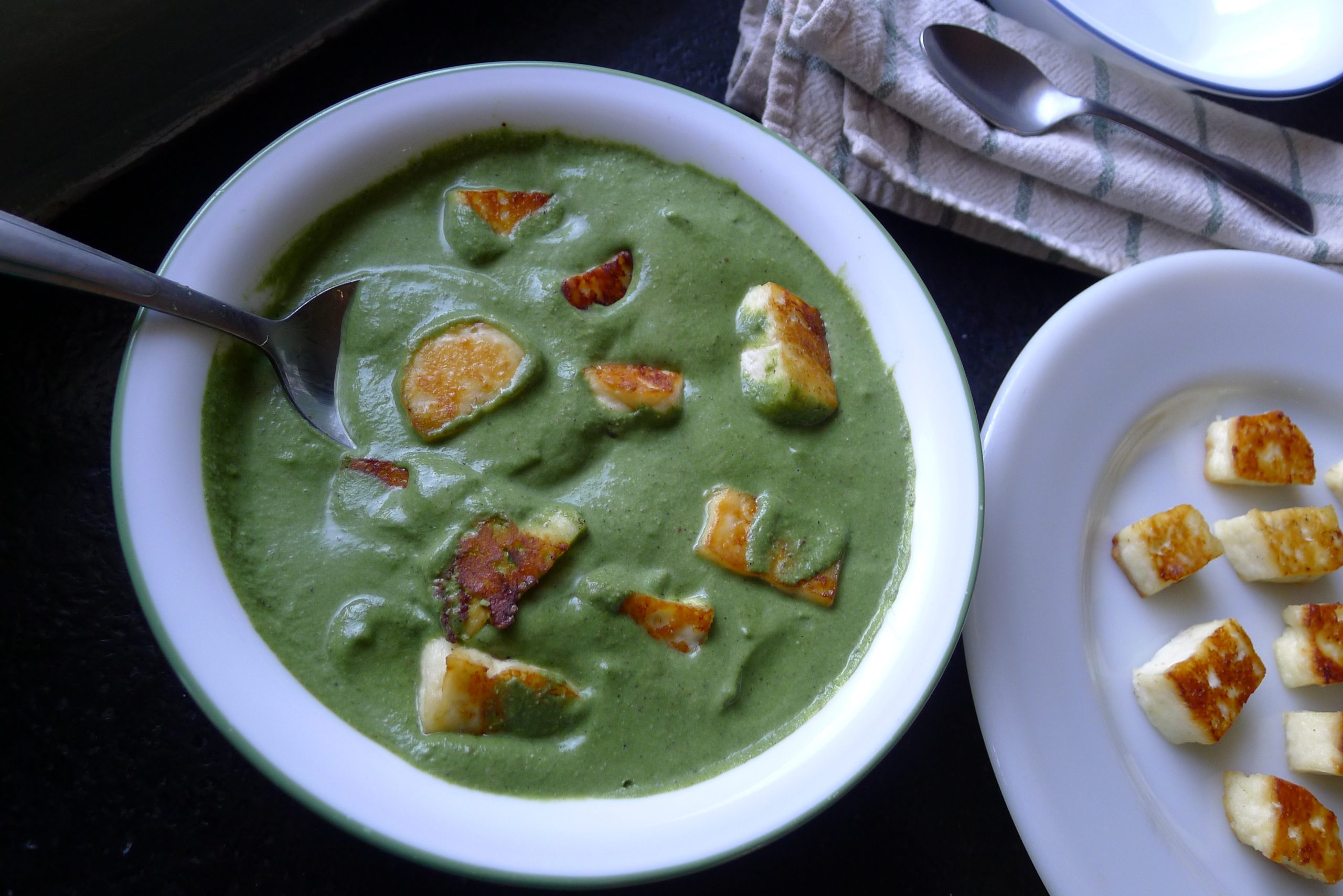Downloads: Word.doc Image #1 Image #2 Image #3
Return to Editor’s Lounge
Copyright Ari LeVaux 2020. No reprints or sharing without permission
I’m Here for the Palak Paneer
I have been celebrating the arrival of spring with helpings of palak paneer, an Indian dish of spinach and homemade cheese. The spinach sauce, supercharged with ginger, serrano peppers and Indian spices, holds the understated cheese in its green embrace, and creates a dramatic, edible contrast. It’s truly amazing how much spinach you can make disappear by cooking it this way.
Frozen spinach is in season too, as food processors must clear freezer space to accommodate the new crop, and liquidate last year’s leftovers. Although I’m not usually a frozen vegetable buyer, I decided to try some of the frozen spinach on sale at my local supermarket. Standing in the frozen food section, I shook a bag of spinach, and could feel a loose mass of irregularly-shaped material inside. I imagined ice crystals and freezer-burnt spinach, and did not have a good feeling about it. But I have heard that freezer technology has come a long way in recent years. And to cap it off, the recipe i was using actually called for frozen spinach. I did not chicken out. And at home, I was rewarded with bright green frost-free nuggets of rolled spinach.
Palak paneer is often mistaken for saag paneer, a popular Indian restaurant dish. The difference is that saag paneer can contain mustard, radish and turnip greens in addition to spinach, while palak paneer contains only spinach.
It is a dish you’ll find anywhere in India, which means there are variations. Of those I have tried, my favorite comes from the blog Feasting at Home. It uses cashews, which add a subtle but rich creaminess, and calls for frozen spinach — but notes you can also use fresh.
So if you are inundated with more spinach than you can handle from your garden or CSA, go for it. While you’re at it, make a big batch and freeze the leftovers, with or without cheese, and save it for later. But if your spinach is limited, save the fresh spinach for raw use, and make palak paneer with frozen spinach.
The paneer, aka Indian cheese, is delicious and surprisingly easy to make. You get a grapefruit sized ball of paneer from a gallon of milk. Press it into a disc and then cut into cubes, which some cooks fry in ghee (clarified butter) before adding to the palak. Whether or not to fry the paneer cubes is a personal choice. A certain innocence is lost, but a distinct crunchiness is gained.
Unfried paneer is cloudlike, softer and decidedly creamier than fried, and blends blissfully with the creamy spinach sauce, unhindered by hard boundaries. The fried cheese, meanwhile, is stiffer, nuttier and sweeter, like a dense, chewy mascarpone with a thin exoskeleton.
I’ve modified the recipe, as surely the blog’s author Sylvia Fountaine did to the recipe from wherever she got it. Compliments to whomever thought to add the cashews.
Palak Paneer
This flavor-packed dish needs no condiment or garnish, and is lovely atop jasmine or basmati rice. For a vegan version, substitute tofu for the cheese and oil for the ghee. Skipping the cheese makes the preparation much simpler and faster.
Paneer:
1 gallon milk
6 tablespoons vinegar + 2 cups water
½ teaspoon salt
Cheesecloth
Palak:
5 tablespoons ghee
1 onion, minced
2 serrano peppers, chopped
2 garlic cloves, chopped
2 tablespoons chopped ginger root
2 teaspoons cumin
2 teaspoons coriander
1 teaspoons mustard seed
2 teaspoons garam masala
1 pound spinach, fresh or frozen
¾ cup yogurt
½ cup cashews
Pour the milk into a thick-bottomed pot. Heat on medium, frequently scouring the bottom with a rubber spatula to prevent buildup. When foaming and about to boil — about 20 minutes — turn off the heat and allow to sit for 10 minutes.
Add the salt and vinegar water, a splash at a time in as dispersed a manner as possible, stirring the pot in a slow circle. It should take about 2 minutes to sprinkle in all of the vinegar. Try not to break up the large curds that form.
Let it cool to room temperature. As it cools it will separate, as the fragments of curdled milk find each other and cling together, as if responding to a curd-specific field of gravity.
While it’s cooling, ladle yourself a cup of curds and whey, a soothing and satisfying snack. And lay double layer of cheesecloth over a colander set it over a pot or bowl.
Carefully pour the curds through the cheesecloth, pull the corners together and use them to tie up the hunk of cheese, and let it drain for an hour. Then untie it and press it between two plates with a weight on top, draining the water that squeezes out. Save all of the whey for ricotta cheese or homemade protein powder or whatever.
While the cheese presses, toast the mustard, cumin and coriander seeds on medium heat for 4 minutes. Add 3 tablespoons of ghee and the garam masala, onions, garlic, ginger and serranos. When the onions are translucent, about 12 minutes, add the spinach and a cup of water. Cook briefly, uncovered, until the spinach collapses — about five minutes. Frozen spinach, meanwhile, only has to melt.
Add the cashews, yogurt and spinach mixture to a blender, and blend.
Cut the disc of cheese into cubes. If you wish, fry the cubes in a tablespoon of ghee until brown on all sides. Heat the palak in a pan, diluting with a little water if it’s too thick. Add the cheese cubes and let them heat up with the spinach.